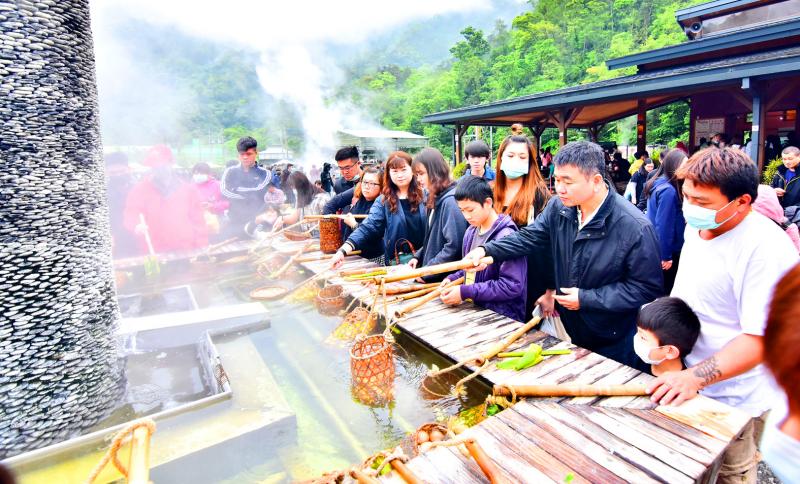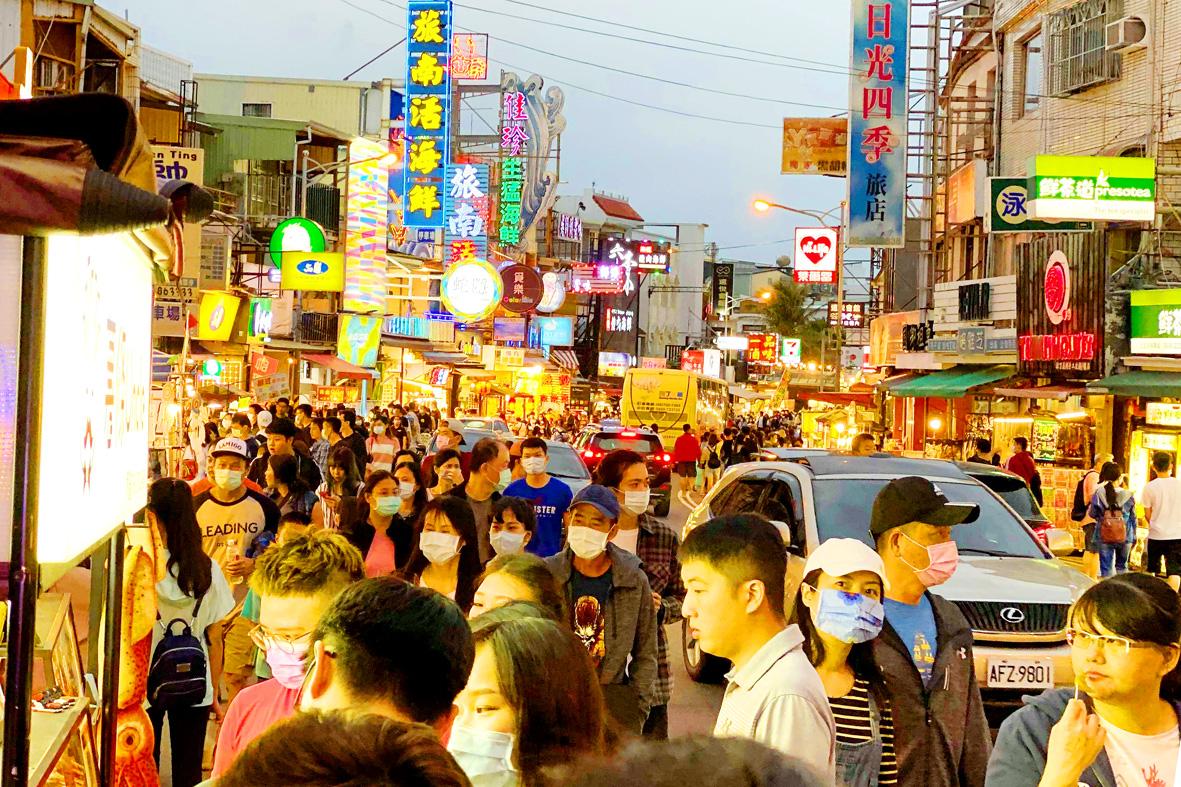The Central Epidemic Command Center (CECC) yesterday sent two warning text messages to urge people to practice social distancing, especially by avoiding crowded scenic areas.
The two messages were sent at 11:55am on the third day of the four-day Tomb Sweeping Day weekend, reminding people about social distancing and hand hygiene to help prevent COVID-19 infection.
“When visiting crowded scenic spots during the Tomb Sweeping Day weekend, please keep a social distance of at least 1.5m indoors and 1m outdoors, wear a mask and wash your hands frequently. Please wear a mask and seek immediate medical attention if you are feeling ill and call 1922 for inquiries,” the first message read.

Photo: Chang Yi-chen, Taipei Times
The second message read: “Please avoid going to scenic areas near Kenting (墾丁). Practice social distancing of at least 1.5m indoors and 1m outdoors, or wear a mask. Please wear a mask and seek immediate medical attention if you are feeling ill and tell the doctor your travel history. Call 1922 for inquiries.”
The first message was sent to cellphones near 11 scenic spots: Alishan National Forest Recreation Area (阿里山國家森林遊樂區); Dongdamen Night Market (東大門夜市) in Hualien County; Wenhua Road in Chiayi City; Guanzihling (關子嶺), Hutoupi (虎頭埤), Wushantou Reservoir (烏山頭水庫) and Wusanto Huching Resort Hotel in Tainan; Bade Pond Ecological Park (埤塘風景區) in Taoyuan; Singda Harbor (興達港) and Chishan Old Street (旗山老街) in Kaohsiung; and Chaotian Temple (朝天宮) in Yunlin County’s Beigang Township (北港).
The second message was sent to phones south of Pingtung County’s Nanjhou Township (南州), including Kenting National Park.

Photo: Tsai Tsung-hsien, Taipei Times
Minister of Health and Welfare Chen Shih-chung (陳時中), who heads the center, yesterday afternoon said that visitor numbers at scenic spots on the first two days of the holiday were greater than expected and people did not do a very good job of social distancing.
“We urge people who are already in those areas to keep the proper social distances and wear a mask, and others to avoid going,” he said, adding that traveling on holidays is relaxing, but social distancing should not be neglected, as there is an increased risk of virus transmission in large groups of people.
Asked whether the center is worried that high rates of domestic tourism on holidays might increase the spread of COVID-19, as happened in Japan and some doctors have warned, Chen said that community spread of the disease began in Japan before the cherry blossom season, while Taiwan has only a few sporadic domestic cases and everyone who returned to Taiwan from overseas was ordered into home quarantine.
After evaluating the risks and considering people’s vacation needs, the center did not announce a “stay home” order for the holidays, but people have to be extra careful and practice enhanced disease prevention measures, he said.
The CECC added that people should wear a mask on public transportation and cooperate with body temperature policies.
Those who refuse to cooperate would face a fine of up to NT$15,000, it said.

The CIA has a message for Chinese government officials worried about their place in Chinese President Xi Jinping’s (習近平) government: Come work with us. The agency released two Mandarin-language videos on social media on Thursday inviting disgruntled officials to contact the CIA. The recruitment videos posted on YouTube and X racked up more than 5 million views combined in their first day. The outreach comes as CIA Director John Ratcliffe has vowed to boost the agency’s use of intelligence from human sources and its focus on China, which has recently targeted US officials with its own espionage operations. The videos are “aimed at

STEADFAST FRIEND: The bills encourage increased Taiwan-US engagement and address China’s distortion of UN Resolution 2758 to isolate Taiwan internationally The Presidential Office yesterday thanked the US House of Representatives for unanimously passing two Taiwan-related bills highlighting its solid support for Taiwan’s democracy and global participation, and for deepening bilateral relations. One of the bills, the Taiwan Assurance Implementation Act, requires the US Department of State to periodically review its guidelines for engagement with Taiwan, and report to the US Congress on the guidelines and plans to lift self-imposed limitations on US-Taiwan engagement. The other bill is the Taiwan International Solidarity Act, which clarifies that UN Resolution 2758 does not address the issue of the representation of Taiwan or its people in

US Indo-Pacific Commander Admiral Samuel Paparo on Friday expressed concern over the rate at which China is diversifying its military exercises, the Financial Times (FT) reported on Saturday. “The rates of change on the depth and breadth of their exercises is the one non-linear effect that I’ve seen in the last year that wakes me up at night or keeps me up at night,” Paparo was quoted by FT as saying while attending the annual Sedona Forum at the McCain Institute in Arizona. Paparo also expressed concern over the speed with which China was expanding its military. While the US

SHIFT: Taiwan’s better-than-expected first-quarter GDP and signs of weakness in the US have driven global capital back to emerging markets, the central bank head said The central bank yesterday blamed market speculation for the steep rise in the local currency, and urged exporters and financial institutions to stay calm and stop panic sell-offs to avoid hurting their own profitability. The nation’s top monetary policymaker said that it would step in, if necessary, to maintain order and stability in the foreign exchange market. The remarks came as the NT dollar yesterday closed up NT$0.919 to NT$30.145 against the US dollar in Taipei trading, after rising as high as NT$29.59 in intraday trading. The local currency has surged 5.85 percent against the greenback over the past two sessions, central